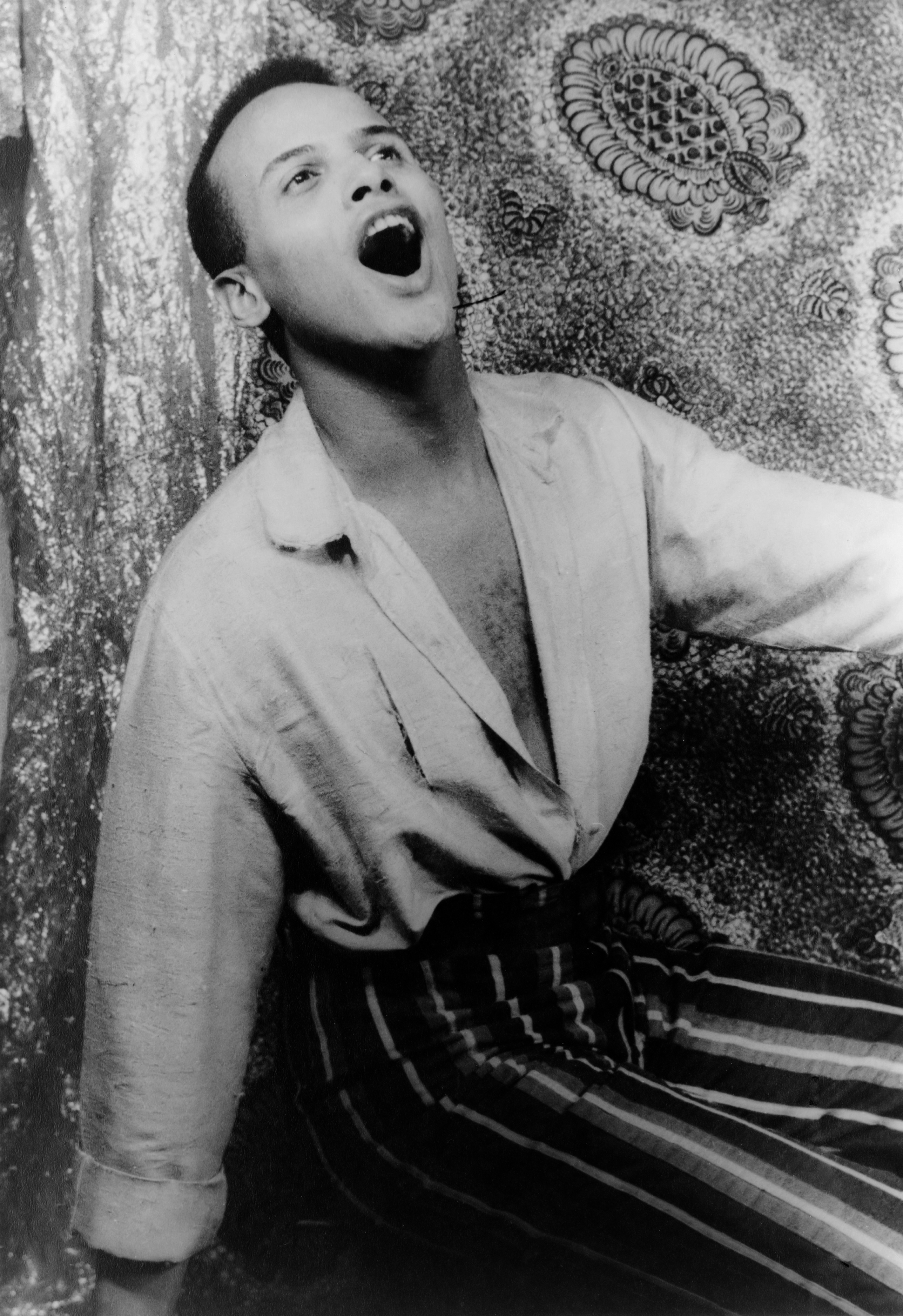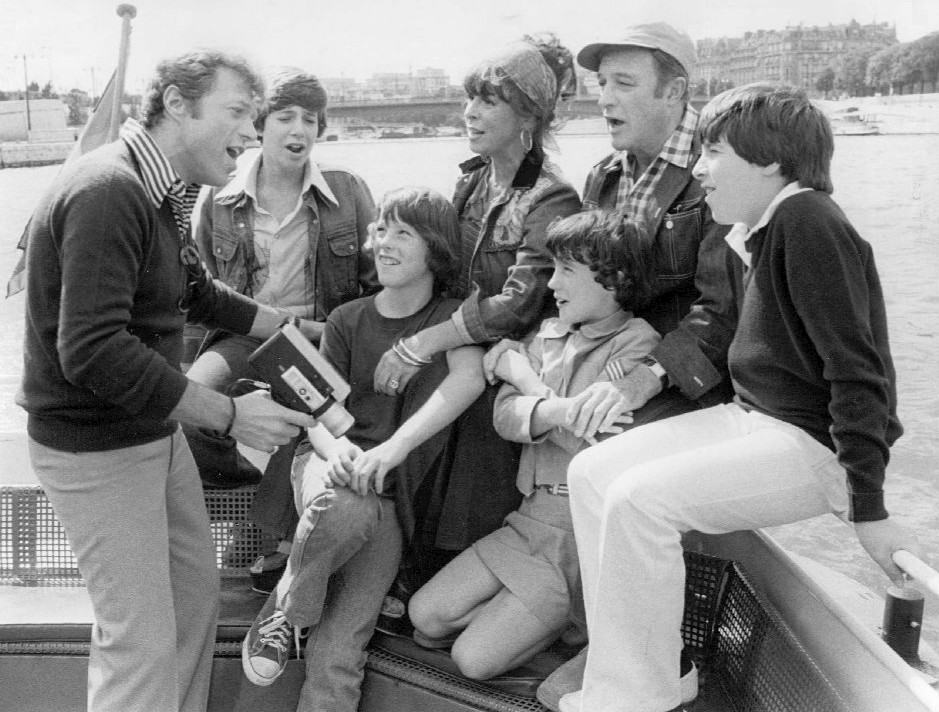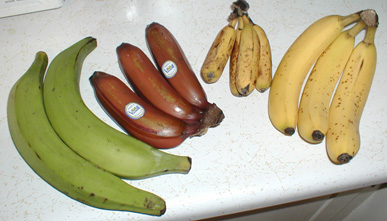|
Banana Boat Song
"Day-O (The Banana Boat Song)" is a traditional Jamaican folk song. The song has mento influences, but it is commonly classified as an example of the better known calypso music. It is a call and response work song, from the point of view of dock workers working the night shift loading bananas onto ships. The lyrics describe how daylight has come, their shift is over, and they want their work to be counted up so that they can go home. The best-known version was released by Jamaican singer Harry Belafonte in 1956 (originally titled "Banana Boat (Day-O)") and later became one of his signature songs. That same year the Tarriers released an alternative version that incorporated the chorus of another Jamaican call and response folk song, "Hill and Gully Rider". Both versions became simultaneously popular the following year, placing 5th and 6th on the 20 February, 1957, US Top 40 Singles chart. The Tarriers version was covered multiple times in 1956 and 1957, including by the Fonta ... [...More Info...] [...Related Items...] OR: [Wikipedia] [Google] [Baidu] |
Harry Belafonte
Harry Belafonte (born Harold George Bellanfanti Jr.; March 1, 1927) is an American singer, activist, and actor. As arguably the most successful Jamaican-American pop star, he popularized the Trinbagonian Caribbean musical style with an international audience in the 1950s. His breakthrough album '' Calypso'' (1956) was the first million-selling LP by a single artist. Belafonte is best known for his recordings of "The Banana Boat Song", with its signature "Day-O" lyric, " Jump in the Line", and " Jamaica Farewell". He has recorded and performed in many genres, including blues, folk, gospel, show tunes, and American standards. He has also starred in several films, including ''Carmen Jones'' (1954), '' Island in the Sun'' (1957), and ''Odds Against Tomorrow'' (1959). Belafonte considered the actor, singer and activist Paul Robeson a mentor, and was a close confidant of Martin Luther King Jr. in the Civil Rights Movement in the 1950s and 1960s. As he later recalled, "Paul Robes ... [...More Info...] [...Related Items...] OR: [Wikipedia] [Google] [Baidu] |
Mento
Mento is a style of Music of Jamaica, Jamaican folk music that predates and has greatly influenced ska and reggae music. It is a fusion of African rhythmic elements and European elements, which reached peak popularity in the 1940s and 1950s. Mento typically features acoustic instruments, such as classical guitar, acoustic guitar, banjo, hand drums, and the rhumba box — a large mbira in the shape of a box that can be sat on while played. The rhumba box carries the bass (sound), bass part of the music. Mento is often confused with Calypso music, calypso, a musical form from Trinidad and Tobago. Although the two share many similarities, they are separate and distinct musical forms. During the mid-20th century, mento was conflated with calypso, and mento was frequently metonym, referred to as ''calypso'', ''kalypso'' and ''mento calypso.'' Mento singers frequently used calypso songs and techniques. As in calypso, mento uses topical lyrics with a humorous slant, commenting on po ... [...More Info...] [...Related Items...] OR: [Wikipedia] [Google] [Baidu] |
Lord Burgess
Irving Louis Burgie (July 28, 1924 – November 29, 2019), sometimes known professionally as Lord Burgess, was an American musician and songwriter, regarded as one of the greatest composers of Caribbean music. "Irving Burgie", ''Songwriters Hall of Fame'' Retrieved 2 December 2019 He composed 34 songs for , including eight of the 11 songs on the Belafonte album '' Calypso'' (1956), the first album of any kind to sell one million copies. Burgie also wrote the lyrics of the [...More Info...] [...Related Items...] OR: [Wikipedia] [Google] [Baidu] |
Louise Bennett
Louise Simone Bennett-Coverley or Miss Lou (7 September 1919 – 26 July 2006), was a Jamaican poet, folklorist, writer, and educator. Writing and performing her poems in Jamaican Patois or Creole, Bennett worked to preserve the practice of presenting poetry, folk songs and stories in patois ("nation language"), establishing the validity of local languages for literary expression. Early life Bennett was born on 7 September 1919 on North Street in Kingston, Jamaica. She was the only child of Augustus Cornelius Bennett, the owner of a bakery in Spanish Town, and Kerene Robinson, a dressmaker. After the death of her father in 1926, Bennett was raised primarily by her mother. She attended elementary school at Ebenezer and Calabar, continuing to St. Simon's College and Excelsior College, in Kingston. In 1943, she enrolled at Friends College in Highgate, St Mary where she studied Jamaican folklore. That same year her poetry was first published in the '' Sunday Gleaner''. In 1945, B ... [...More Info...] [...Related Items...] OR: [Wikipedia] [Google] [Baidu] |
Edric Connor
Edric Esclus Connor (2 August 1913 – 13 October 1968) was a Caribbean singer, folklorist and actor who was born in Trinidad and Tobago. He was a performer of calypso in the United Kingdom, where he migrated in 1944 and chiefly lived and worked for the rest of his life until he died following a stroke in London, at the age of 55. Early life and education Edric Esclus Connor was born in 1913 in Mayaro, Trinidad.Stephen Bourne"Mogotsi, Pearl Cynthia Connor- (1924–2005)" ''Oxford Dictionary of National Biography'', Oxford University Press, 2009. When he was 16 he won a Trinidad government scholarship to study engineering at the Victoria Institute, Port of Spain, in his spare time he studied Caribbean folk singing. Career During World War II he worked on the construction of the American naval air base in Trinidad. Having saved enough money to go to Britain, initially with the intention of continuing his engineering studies, he settled there in 1944, making his debut on BBC ... [...More Info...] [...Related Items...] OR: [Wikipedia] [Google] [Baidu] |
Trinidad
Trinidad is the larger and more populous of the two major islands of Trinidad and Tobago. The island lies off the northeastern coast of Venezuela and sits on the continental shelf of South America. It is often referred to as the southernmost island in the West Indies. With an area of , it is also the List of Caribbean islands by area, fifth largest in the West Indies. Name The original name for the island in the Arawak language, Arawaks' language was which meant "Land of the Hummingbird". Christopher Columbus renamed it ('The Island of the Holy Trinity, Trinity'), fulfilling a vow he had made before setting out on his third voyage. This has since been shortened to ''Trinidad''. History Island Caribs, Caribs and Arawaks lived in Trinidad long before Christopher Columbus encountered the islands on his third voyage on 31 July 1498. The island remained Spanish until 1797, but it was largely settled by French colonists from the French Caribbean, especially Martinique.Besson, ... [...More Info...] [...Related Items...] OR: [Wikipedia] [Google] [Baidu] |
Shirley Bassey
Dame Shirley Veronica Bassey (; born 8 January 1937) is a Welsh singer. Best known for her career longevity, powerful voice and recording the theme songs to three James Bond films, Bassey is widely regarded as one of the most popular vocalists in Britain. Born in Cardiff, Bassey began performing as a teenager in 1953. In 1959, she became the first Welsh person to gain a number-one single on the UK Singles Chart. In the following decades, Bassey amassed 27 Top 40 hits in the UK, including two number-ones. She became well-known for recording the soundtrack theme songs of the James Bond films '' Goldfinger'' (1964), '' Diamonds Are Forever'' (1971), and '' Moonraker'' (1979). In 2020, Bassey became the first female artist to chart an album in the Top 40 of the UK Albums Chart in seven consecutive decades with her album ''I Owe It All To You''. Bassey has also had numerous BBC television specials, and she hosted her own variety series, '' Shirley Bassey''. In 2011, BBC aired the t ... [...More Info...] [...Related Items...] OR: [Wikipedia] [Google] [Baidu] |
Steve Lawrence
Steve Lawrence (born Sidney Liebowitz; July 8, 1935) is an American singer, comedian and actor, best known as a member of a duo with his wife Eydie Gormé, billed as " Steve and Eydie", and for his performance as Maury Sline, the manager and friend of the main characters in ''The Blues Brothers''. Steve and Eydie first appeared together as regulars on ''Tonight Starring Steve Allen'' in 1954 and continued performing as a duo until Gormé's retirement in 2009. Gormé died August 10, 2013.2003 Interview with , from a website (web archive from |
Sarah Vaughan
Sarah Lois Vaughan (March 27, 1924 – April 3, 1990) was an American jazz singer. Nicknamed "Sassy" and "Jazz royalty, The Divine One", she won two Grammy Awards, including the Lifetime Achievement Award, and was nominated for a total of nine Grammy Awards. She was given an NEA Jazz Masters Award in 1989. Critic Scott Yanow wrote that she had "one of the most wondrous voices of the 20th century". Early life Vaughan was born in Newark, New Jersey, to Asbury "Jake" Vaughan, a carpenter by trade who played guitar and piano, and Ada Vaughan, a laundress who sang in the church choir, migrants from Virginia. The Vaughans lived in a house on Brunswick Street in Newark for Vaughan's entire childhood. Jake was deeply religious. The family was active in New Mount Zion Baptist Church at 186 Thomas Street. Vaughan began piano lessons at the age of seven, sang in the church choir, and played piano for rehearsals and services. She developed an early love for popular music on records and th ... [...More Info...] [...Related Items...] OR: [Wikipedia] [Google] [Baidu] |
The Fontane Sisters
The Fontane Sisters were a trio (Bea, Geri and Marge Rosse) from New Milford, New Jersey. Early years Born to an Italian family, their mother, Louise Rosse, was both a soloist and the leader of the St. Joseph's Church choir in New Milford. Bea and Marge started out singing for local functions, doing so well that they were urged to audition in New York City. Originally they performed as a trio with their guitarist brother Frank, under the name the Ross Trio (Rosse with the "e" omitted). The group auditioned for NBC and was soon sent off to work in Cleveland. When they returned to New York in 1944, Frank was drafted into the Army; he went to France and was mortally wounded by a German sniper. Geri, who had just finished school, took her brother's place, making it an all-girl trio. The sisters first performed together as The Three Sisters. Sheet music of two of their songs, "I'm Gonna See My Baby", and "Pretty Kitty Blue Eyes", was published by Santly-Joy in 1944. Success The n ... [...More Info...] [...Related Items...] OR: [Wikipedia] [Google] [Baidu] |
The Tarriers
The Tarriers were an American vocal group, specializing in folk music and folk-flavored popular music. Named after the folk song " Drill, Ye Tarriers, Drill", the group had two hit songs during 1956-57: "Cindy, Oh Cindy" (with Vince Martin) and "The Banana Boat Song." The two singles became US Top Ten hits and peaked at No. 26 and No. 15 respectively in the UK Singles Chart. Career The group formed from a collection of folk singers who performed regularly at Washington Square in New York City during the mid-1950s, including Erik Darling and Bob Carey. "Eventually it became the Tarriers, with Bob, me, Karl Karlton and Alan Arkin," Darling told Wayne Jancik in ''The Billboard Book of One-Hit Wonders''. According to Darling, "Karl didn't really mesh" and left the group before the remaining trio secured a contract with Glory Records in 1956, where the Tarriers scored two hits.Wayne Jancik, ''The Billboard Book of One-Hit Wonders'', expanded first edition (Billboard Books, 1998) , ... [...More Info...] [...Related Items...] OR: [Wikipedia] [Google] [Baidu] |
Banana
A banana is an elongated, edible fruit – botanically a berry – produced by several kinds of large herbaceous flowering plants in the genus ''Musa''. In some countries, bananas used for cooking may be called "plantains", distinguishing them from dessert bananas. The fruit is variable in size, color, and firmness, but is usually elongated and curved, with soft flesh rich in starch covered with a rind, which may be green, yellow, red, purple, or brown when ripe. The fruits grow upward in clusters near the top of the plant. Almost all modern edible seedless ( parthenocarp) bananas come from two wild species – ''Musa acuminata'' and ''Musa balbisiana''. The scientific names of most cultivated bananas are ''Musa acuminata'', ''Musa balbisiana'', and ''Musa'' × ''paradisiaca'' for the hybrid ''Musa acuminata'' × ''M. balbisiana'', depending on their genomic constitution. The old scientific name for this hybrid, ''Musa sapientum'', is no longer used. ''Musa ... [...More Info...] [...Related Items...] OR: [Wikipedia] [Google] [Baidu] |






